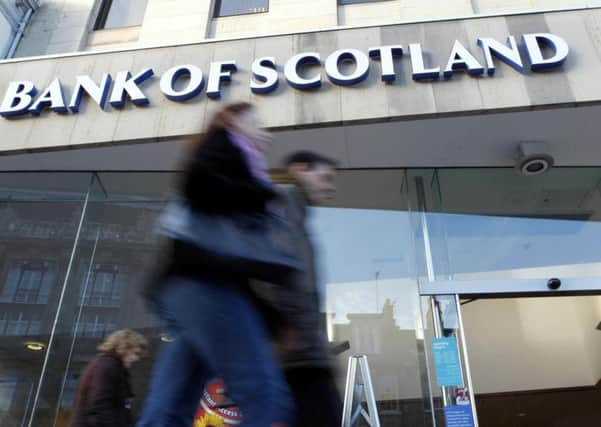Bank of Scotland accused of ‘criminal fraud’


John Larkin QC said the matter of how the bank treated those in arrears had now been drawn to the attention of the police.
The bank yesterday dropped its appeal against a court ruling from August that it had unfairly double-billed customers whose mortgages were in arrears. However, it denied that any fraud had taken place.
Advertisement
Hide AdAdvertisement
Hide AdDuring the original case the High Court in Belfast heard how the bank had tackled arrears with capitalisation, a standard practice which has the effect of increasing borrowers’ monthly repayments.
The judge, Master Ellison, ruled that once capitalisation had taken place, the mortgage should no longer be considered in arrears.
However, the bank continued to treat such mortgages as in arrears and used that as the basis for bringing legal cases.
Despite a scathing verdict at the time, which accused the bank of “having its cake and eating it”, Mr Larkin yesterday said the judgement had been “unduly tender”.
Mr Larkin, the chief legal adviser to the Northern Ireland Executive, acknowledged it was extraordinary for him to intervene in matters of “private law”.
However, he told the court there was evidence of “criminal fraud under the 2006 Act” and said the matter has now been drawn to the attention of the police.
A barrister for the bank, Stephen Shaw QC, said Mr Larkin’s view of the matter was “based on a misapprehension”.
CONNECT WITH THE SCOTSMAN
• Subscribe to our daily newsletter (requires registration) and get the latest news, sport and business headlines delivered to your inbox every morning
Advertisement
Hide AdAdvertisement
Hide AdThe initial ruling in August was thought to have implications for thousands of Bank of Scotland mortgage holders across the United Kingdom.
The Housing Rights Service which took the case after discovering a pattern of capitalisation in 2013 said if the bank’s practice had gone unchallenged, many borrowers would have lost their homes.
At the earlier court hearing in August, details emerged of how Bank of Scotland had added arrears to the capital sum of the mortgage, in at least one case on four separate occasions from 2009 and monthly payments had risen (on a largely unchanged interest rate) by amounts between around £150-£500 per month.
In a statement issued after the court hearing yesterday, a spokeswoman for Lloyds Banking Group said: “There have been no allegations of fraud in these cases.
“We strongly take issue with any implication that this is the case. We have offered to meet with both Housing Rights Service and the attorney general in order to correct the assumptions on which these allegations have been made.”
On its decision to drop its appeal, the bank said: “We no longer believe that an appeal is necessary in this case and as such have withdrawn from the appeal process. We would reiterate that repossession is always a last resort.
“We work hard to ensure that we are providing customers facing financial difficulty with the right support to help ease their circumstances and ultimately help to resolve the situation in what we appreciate is an extremely sensitive time.”
The Police Service of Northern Ireland (PSNI) said it had received correspondence from the attorney general and would now “examine the concerns outlined”.
Advertisement
Hide AdAdvertisement
Hide AdThe judge’s verdict in August said the bank’s behaviour had been “unconscionable”.
Master Ellison said it had caused borrowers to be “plunged into depression”, leaving them threatened with repossession on account of an “erroneous and fictional arrears balance”.
The judgement concerned three separate cases brought with the support of the Housing Rights Service (HRS).
One of the people who took a case, with the support of the HRS, was a bank worker.
The court heard that she fell behind on her mortgage because she had to leave her home for a period of time on police advice.
She was warned she was in danger from a criminal conspiracy. In addition, she suffered the death of her partner.
She has now returned to her home and has been making monthly payments above the contracted amount for well over a year.
Yesterday’s comments from the attorney general are just the latest controversy which Bank of Scotland and its parent firm, Lloyds Banking Group, has found itself in.
Advertisement
Hide AdAdvertisement
Hide AdEarlier this year Lloyds and Bank of Scotland were fined £105 million by the Financial Conduct Authority (FCA) for “serious misconduct” relating to the Special Liquidity Scheme (SLS), the Repo Rate benchmark and the inter-bank lending rate, Libor.
Lloyds also paid $105m (£65m) to the US Commodity Futures Trading Commission and $86m to the US Department of Justice.
Meanwhile, Lloyds is thought to have set aside more than £10 billion to cover compensation claims relating to the misselling of payment protection insurance (PPI).
A quarter of Lloyds Banking Group remains in the hands of the taxpayer after the UK government’s £20bn bailout during the 2008 financial crisis.
SEE ALSO
SCOTSMAN TABLET AND IPHONE APPS